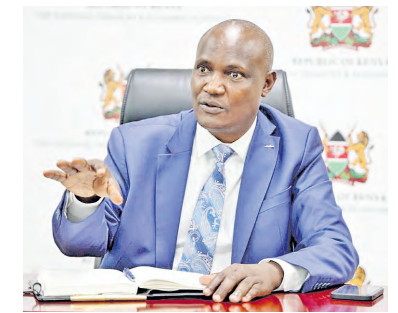

Governors have suffered a setback after the National Treasury reaffirmed its plan to roll out an integrated revenue collection system for counties.
Treasury CS John Mbadi maintained that the new platform, which will replace the systems in use across counties, is ready for implementation.
“We are rolling out an integrated county revenue management system. It is going to replace this fragmented county revenue management framework,” Mbadi said.
Through their umbrella body, the Council of Governors, county chiefs have opposed what they see as an attempt by the national government to dictate the systems they should use.
In 2023, they rejected a Bill requiring counties to develop revenue collection systems in collaboration with the Kenya Revenue Authority.
“A significant number of counties are already implementing revenue collection systems that ought to be recognised by law, as public resources have been used to develop them,” the CoG said at the time.
During a session with the Senate County Public Accounts Committee on Thursday, Mbadi argued that it was illogical for the country to operate so many separate systems.
“We cannot have 47 or 48 systems in a country dealing with revenue collection. We should have at most two or three,” he said.
The ministry had held extensive consultations with stakeholders, including governors, to pave the way for the rollout.
“We have discussed this at the Intergovernmental Budget and Economic Council. Though there has been pushback from governors, as expected, I think we are getting to a point of clarity. There was just a misunderstanding,” Mbadi noted.
Counties operate disjointed systems, with some contracting financial technology firms to automate and collect revenue on their behalf.
These contracts often cost millions of shillings in procurement fees, plus commissions on every shilling collected.
Last year, KRA commissioner general Humphrey Wattanga told senators that the lack of standardised revenue administration and collection processes—due to the use of different vendors—was hurting county revenues.
He warned that procurement of these systems also presents challenges such as unclear technical requirements and vendor-driven contracting processes.
“Additionally, vendors usually charge a percentage of revenue collected, which in some cases is unreasonably high,” Wattanga said.
Some counties have yet to automate revenue collection and continue to rely on manual systems, many of them outdated and inherited from defunct local authorities, such as the Local Authority Integrated Financial Operations Management System.
In 2024, senators pushed Auditor General Nancy Gathungu to audit all external revenue collection firms contracted by counties, amid concerns over the accuracy of declared figures. Lawmakers warned that the lack of oversight had created loopholes through which companies could siphon billions from devolved units.
Gathungu said counties were losing significant amounts of revenue due to the contracting of questionable firms, some of which existed only on paper.
She reminded senators that while the law empowers the National Treasury to prescribe revenue collection systems for counties, governors had often engaged vendors without due diligence—agreeing to widely varying commission rates.
“The rates should be standardised so that the commission charged does not vary from one county to another. The lack of uniformity is a major reason counties are losing a lot of revenue,” she said.
Instant Analysis
The Kenya Revenue Authority is rooting for the deployment of an integrated county revenue management system to seal leakages costing the counties billions of shillings. KRA commissioner general Humphrey Wattanga told the Senate ICT committee how the devolved units are losing revenue. Currently, counties use disjointed systems, with some contracting financial technology firms to automate and collect revenue on their behalf.














